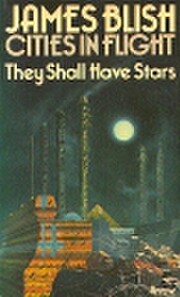

Click on a thumbnail to go to Google Books.
|
Loading... They Shall Have Stars (Cities in flight / James Blish) (original 1956; edition 1974)by James Blish (Author)
Work InformationThey Shall Have Stars by James Blish (1956)
 No current Talk conversations about this book. They Shall Have Stars is the first novel in the four part Cities in Flight series, written in 1956 it's not particularly well known but is nonetheless quite a good little tale. It follows two people caught up within a dystopian style American future where paranoia reigns supreme and within government projects secret research on life extension and gravity are being done - whilst not a seemingly interesting subject in and of itself, it is actually interesting and is the groundwork for further expansion of the story in the following books. I recently got the urge to re-read James Blish's 'Cities in Flight', a sequence that I enjoyed greatly when I was first discovering science fiction in the 1970s and which I re-read fairly regularly up to my twenties. When I first came across the novels, I read them almost in reverse order; this time, I have started with the first novel in the sequence, 'They shall have stars'. (Note: the whole sequence has since been reissued bound together as one book; but I first read it as four separate novels, and my Arrow UK paperbacks, dating from the 1970s, are similarly separated; so it'll be four reviews in due course, and I shall bring all of them together on my separate reviews blog, 'Deep Waters Reading' [http://deepwatersreading.wordpress.com/].) Anyway, I hope the rest of my re-read of 'Cities in Flight' comes up better than this. It wasn't just that the writing was so very 1950s; it wasn't just that the science - especially in light of what we now know about Jupiter - now comes up so very badly wrong. It wasn't even that the setting of the novel, which in 1954 was the impossibly distant year of 2018, had so very few matches with the reality of the early 21st century, either in technology, society or international politics (although interestingly, the two female characters in the novel are neither ciphers nor do they conform 100% to traditional male stereotypes of women) (more like about 45%, I'd reckon). It was the way in which so much of the novel - about 2/3rds - is characters sat in offices or restaurants doing the "Now tell me, Professor" thing. Most of the novel is just two big expository lumps. And whilst the science sounds plausible - Blish's day job was as a biologist for the Pfizer company, thinly disguised as 'Pfitzner' in the novel - it's only really good for what he knew. His planetary science was pretty shaky, even for the state of knowledge of the day. I can stand science fiction becoming out-of-date - after all, despite what a lot of people think, SF isn't prediction - but when the whole story hinges on a number of different scientific scenarios, all of which turned out to be wrong, it rather impacts the tale. The political landscape of the book is interesting; the USA and the Soviet Union have become more like each other as the Cold War dragged on, to the extent that the USA is now an almost totalitarian state, in the interests of loyalty. Those with a bent for political commentary will smile a bit at this, because many believe that is rapidly coming true; but Blish's idea of how this might happen and what it could look like is pretty heavy-handed, and so really didn't work for me. Having said that, the imagery of the Bridge on Jupiter is quite effective, even though even some of the characters recognise that it's one huge McGuffin; and one of the main character's surprise at encountering the first spindizzy-powered ship is effectively conveyed. But this only lasts for the duration of the (now short) voyage from Earth to Ganymede; then we're back to the talking heads. And the final message - abandon Earth to the Soviets and Take Freedom to the Stars - seems pretty clunky. I'd always thought Blish was more sophisticated than that. And quite why Blish thought he needed to tell the story about how his future technology got invented in the first place is a bit beyond me. This novel, after all, was written second in the sequence, after the work that became (in its UK incarnation) 'Earthman, come home'. It's as if Frank Herbert had written a whole Dune novel about how someone first discovered the qualities of spice, and then told everyone exactly how they'd refined it, tested it in the laboratory, and then done clinical trials. All very interesting for biologists if it was a scientific paper, but it doesn't make for great reading. It's not even as if the story in the next novel, 'A Life for the Stars' then carries on from where this novel leaves off; there is, as far as I recollect, no narrative connection, even a slight one, between this and the next book in the sequence, not even a reference to the characters or events of the first book as history. So, not a propitious start to my re-read. I'm hoping for better. no reviews | add a review
Belongs to SeriesVilles Nomades (01) Belongs to Publisher SeriesAvon (T193) Delta Science Fiction (196) New English Library (2934) Présence du futur (80) Is contained in
No library descriptions found. |
Current DiscussionsNonePopular covers
 Google Books — Loading... Google Books — Loading...GenresMelvil Decimal System (DDC)823Literature English & Old English literatures English fictionLC ClassificationRatingAverage: (3.22) (3.22)
Is this you?Become a LibraryThing Author. |
|||||||||||||||||||||||||||||||||||||||||||||||||||||||||||||||||||||||||||||||||||||||||||||||||||||||||||||||||||||
Do you self a favor and skip this introductory prequel. (